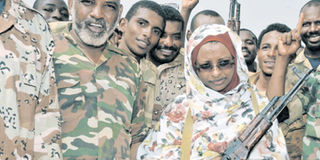Sudans in blame game over border row

Photo/AFP
Sudanese State Minister of Information Sana Hamad with Sudanese soldiers in the oil town of Heglig last week. South Sudan accused the North of declaring war as Khartoum’s warplanes bombed border regions in defiance of international calls for restraint.
President Kibaki has urged Sudan and its neighbour South Sudan to give dialogue a chance but the two countries are far from ready to face each other at any negotiating table.
Sudan ambassador to Kenya Kamal Ismail Saeed and South Sudan Embassy Charge D’Affairs Kur Garang Deng spoke to the Nation about the latest conflict.
Q. What is the latest dispute about?
A.MR SAEED: Since the separation of South Sudan last year we were involved in different discussions to settle the pending issues around the borders, debts, oil fields and other consequences of the separation.
While doing this we have been subjected to provocations from our brothers in the South. Last time they attacked our troops at the border and killed almost 200 soldiers.
Again we had agreed with Juba to change their currency gradually over a period of six months but they printed their own immediately without consulting us.
They wanted to distort our economy. In the case of using our pipelines to transport oil we allowed them freely for seven months and after we agreed on African Union proposed charges, they refused and shut their oil production.
Now they are occupying our land, Heglig.
Q. South Sudan claims the aerial bombs by the North in its territory has provoked them to act in self-defence. What is your position?
A.MR SAEED: Yes, there have been bombings carried out by the Sudan but they only targeted the rebel camps harboured by the South Sudan government. These rebels have been continuously attacking our people.
Q. Are you prepared for total war if South Sudan refuses to move out of Heglig?
A.MR SAEED: It is our moral, legal right to protect our territory. We have decided to make their stay there uncomfortable because it is purely aggression from them. The UN, African Union, Arab League, and all other regional organisations rejected their invasion.
Q: Is this the right moment to fight yet there are other developmental challenges facing the two countries?
A. MR SAEED: It is our right to fight to protect our people. They are allocating their meagre resources for unworthy courses, stupid conflicts instead of constructive assignments.
We do not have any problem with the population in the South only the political group in Juba. As a matter of fact this is a war by proxy where South Sudanese soldiers are being used by Westerners to fight us.
Q.Do you have any evidence to back your claims?
A.MR SAEED: Yes, several countries that have been fighting us in the last decades now have a cheaper force in the South Sudanese army. It is not logical for a young country that is still building its under-developed sectors to engage in war, that is why we think they are being used to fulfil someone else’s agenda.
Q. Former South African President Thabo Mbeki is leading a high level committee which seeks to resolve pending issues as agreed in the CPA. Do you still believe the committee has the strength to resolve the issues?
A.MR SAEED: We still have faith in Mr Mbeki. Once they get out of Heglig we will be back in the negotiating table.
Responses from South Sudanese Charge D’Affairs Kur Garang Deng
Q. What is the latest dispute about?
A.MR DENG: We have been provoked by Sudan at the border. Since independence they have been attacking our forces. They want to push back the people of South Sudan and then take some of the areas.
They are taking advantage that we just got independence so it is good to steal their land. It is us who have have been attacked.
Sudan is bombing us night and day in Unity State, Upper Nile State and other bordering states. We cannot sit back and do nothing.
Q.Do you have any evidence that it is Sudan that is bombing your territory?
A.MR DENG: We have enough of it. Some of the planes have been shot down and we know by their identities who their owners are. We also have several war prisoners who have revealed to us who they were fighting for.



